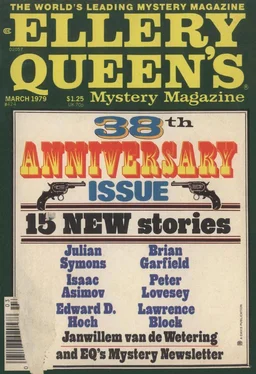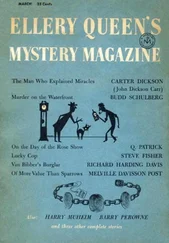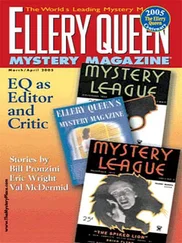Isaac Asimov - Ellery Queen’s Mystery Magazine, Vol. 73, No. 3. Whole No. 424, March 1979
Здесь есть возможность читать онлайн «Isaac Asimov - Ellery Queen’s Mystery Magazine, Vol. 73, No. 3. Whole No. 424, March 1979» весь текст электронной книги совершенно бесплатно (целиком полную версию без сокращений). В некоторых случаях можно слушать аудио, скачать через торрент в формате fb2 и присутствует краткое содержание. Город: New York, Год выпуска: 1979, ISBN: 1979, Издательство: Davis Publications, Жанр: Детектив, на английском языке. Описание произведения, (предисловие) а так же отзывы посетителей доступны на портале библиотеки ЛибКат.
- Название:Ellery Queen’s Mystery Magazine, Vol. 73, No. 3. Whole No. 424, March 1979
- Автор:
- Издательство:Davis Publications
- Жанр:
- Год:1979
- Город:New York
- ISBN:ISSN: 0013-6328
- Рейтинг книги:3 / 5. Голосов: 1
-
Избранное:Добавить в избранное
- Отзывы:
-
Ваша оценка:
- 60
- 1
- 2
- 3
- 4
- 5
Ellery Queen’s Mystery Magazine, Vol. 73, No. 3. Whole No. 424, March 1979: краткое содержание, описание и аннотация
Предлагаем к чтению аннотацию, описание, краткое содержание или предисловие (зависит от того, что написал сам автор книги «Ellery Queen’s Mystery Magazine, Vol. 73, No. 3. Whole No. 424, March 1979»). Если вы не нашли необходимую информацию о книге — напишите в комментариях, мы постараемся отыскать её.
Ellery Queen’s Mystery Magazine, Vol. 73, No. 3. Whole No. 424, March 1979 — читать онлайн бесплатно полную книгу (весь текст) целиком
Ниже представлен текст книги, разбитый по страницам. Система сохранения места последней прочитанной страницы, позволяет с удобством читать онлайн бесплатно книгу «Ellery Queen’s Mystery Magazine, Vol. 73, No. 3. Whole No. 424, March 1979», без необходимости каждый раз заново искать на чём Вы остановились. Поставьте закладку, и сможете в любой момент перейти на страницу, на которой закончили чтение.
Интервал:
Закладка:
“Yes, sir.”
“Were you told that she finished the affair, that she decided to stay with her husband?”
“Yes, sir.”
The engineer was tidying up the counter mechanically. “I see. So I could be a suspect. Tried to get at her out of spite or something. But I am not a spiteful man. You wouldn’t know that. I don’t mind being a suspect, but I would like to see Ann. She is in the hospital, you said. What hospital?”
“The Wilhelmina, sir.”
“Can’t leave the kids here, can I? Maybe the neighbors will take them for an hour or so... yes. I’ll go and see Ann. This is terrible.”
Grijpstra marched to the front door with de Gier trailing behind him. “Don’t move from the house today if you please, sir, not until we telephone or come again. We’ll try and be as quick as we can.”
“Nice chap,” de Gier said when the car found its parking place in the vast courtyard of headquarters. “That engineer, I mean. I rather liked Mr. Moozen too, and Mrs. Moozen is a lovely lady. Now what?”
“Go back to the Moozen house, Sergeant, and get a sample of the roaring bunny. Bring it to the laboratory together with this envelope. If they check we have a heavy point against the engineer.”
De Gier restarted the engine. “Maybe he is not so nice, eh? He could have driven his wife crazy and now he tries to murder his girlfriend, his ex-girlfriend. Lovely Ann Moozen who dared to stand him up. Could be, do you think so?”
Grijpstra leaned his bulk against the car and addressed his words to the emptiness of the yard. “No. But that could be the obvious solution. He was distressed, genuinely distressed, I would say. If he hadn’t been and if he hadn’t had those kids in the house, I might have brought him in for further questioning.”
“And Mr. Moozen?”
“Could be. Maybe he didn’t find the bunny on the garden path; maybe he put it there, or maybe he had it ready in the cupboard and brought it to his wandering wife. He is a lawyer — lawyers can be devious at times. True?”
De Gier said, “Yes, yes, yes...” and kept on saying so until Grijpstra squeezed the elbow sticking out of the car’s window. “You are saying yes , but you don’t sound convinced.”
“I thought Moozen was suffering too.”
“Murderers usually suffer, don’t they?”
De Gier started his “Yes, yes,” and Grijpstra marched off.
They met an hour later, in the canteen in headquarters. They munched rolls stuffed with sliced liver and roast beef and muttered diligently at each other.
“So it is the same chocolate?”
“Yes, but that doesn’t mean much. One of the lab’s assistants has a father who owns a pastry shop. He said that there are only three mixes on the market and our stuff is the most popular make. No, not much of a clue there.”
“So?”
“We may have a full case on our hands. We should go back to Mr. Moozen, I think, and find out about friends and relatives. Perhaps his wife had other lovers, or jealous lady friends.”
“Why her?”
Grijpstra munched on. “Hmm?”
“Why her?” de Gier repeated. “Why not him?”
Grijpstra swallowed. “Him? What about him?”
De Gier reached for the plate, but Grijpstra restrained the sergeant’s hand. “Wait, you are hard to understand when you have your mouth full. What about him?”
De Gier looked at the roll. Grijpstra picked it up and ate it.
“Him,” de Gier said unhappily. “He found the bunny on the garden path, the ferocious bunny holding the pernicious egg. A gift, how nice. But he doesn’t eat chocolate, so he runs inside and shows the gift to his wife and his wife grabs the egg and eats it. She may have thought he was giving it to her, she was still half asleep. Maybe she noticed the taste, but she ate on to please her husband. She became ill at once and he telephoned for an ambulance. Now, if he had wanted to kill her he might have waited an hour or so, to give the poison a chance to do its job. But he grabbed his phone, fortunately. What I am trying to say is, the egg may have been intended for him, from an enemy who didn’t even know Moozen had a wife, who didn’t care about killing the wife.”
“Ah,” Grijpstra said, and swallowed the last of the roll. “Could be. We’ll ask Mr. Moozen about his enemies. But not just now. There is the dead man we found in the park — a message came in while you were away. A missing person has been reported and the description fits our corpse. According to the radio room a woman phoned to say that a man who is renting a room in her house has been behaving strangely lately and has now disappeared. She traced him to the corner bar where he spent last evening, until two A.M. when they closed.
“He was a little drunk according to the barkeeper, but not blind drunk. She always takes him tea in the morning, but this morning he wasn’t there and the bed was still made. But she does think he’s been home, for she heard the front door at a little after two A.M., opening and closing twice. He probably fetched the rope and his campstool then.”
“And the man was fairly old and has a short gray beard?”
“Right.”
“So we go and see the landlady. I’ll get a photograph — they took dozens this morning and they should be developed by now. Was anything found in his clothes?”
“Nothing.” Grijpstra looked guiltily at the empty plate. “Want another roll?”
“You ate it.”
“That’s true, and the canteen is out of rolls; we got the last batch. Never mind, Sergeant. Let’s go out and do some work. Work will take your mind off food.”
“That’s him,” the landlady with the plastic curlers said. Her glasses had slipped to the tip of her blunt nose while she studied the photograph. “Oh, how horrible! His tongue is sticking out. Poor Mr. Marchant, is he dead?”
“Yes, ma’am.”
“For shame, and such a nice gentleman. He has been staying here for nearly five years now and he was always so polite.”
Grijpstra tried to look away from the glaring pink curlers, pointing at his forehead from the woman’s thinning hair.
“Did he have any troubles, ma’am? Anything that may have led him to take his own life?”
The curlers bobbed frantically. “Yes. Money troubles. Nothing to pay the taxman with. He always paid the rent, but he hadn’t been paying his taxes. And his business wasn’t doing well. He has a shop in the next street; he makes things — ornaments he calls them, out of brass. But there was some trouble with the neighbors. Too much noise, and something about the zoning too; this is a residential area now, they say. The neighbors wanted him to move, but he had nowhere to move to, and he was getting nasty letters, lawyers’ letters. He would have had to close down, and he had to make money to pay the taxman. It was driving him crazy. I could hear him walk around in his room at night, round and round until I had to switch off my hearing aid.”
“Thank you, ma’am.”
“He was alone,” the woman said and shuffled with them to the door. “All alone, like me. And he was always so nice.” She was crying.
“Happy Easter,” de Gier said, and opened the Volkswagen’s door for the adjutant.
“The same to you. Back to Mr. Moozen again — we are driving about this morning. I could use some coffee again. Maybe Mr. Moozen will oblige.”
“He won’t be so happy either. We aren’t making anybody happy today,” the sergeant said and tried to put the Volkswagen into first gear. The gear slipped and the car took off in second.
They found Mr. Moozen in his garden. It had begun to rain again, but the lawyer didn’t seem to notice that he was getting wet. He was staring at the bright yellow crocuses, touching them with his foot. He had trampled a few of them into the grass.
Читать дальшеИнтервал:
Закладка:
Похожие книги на «Ellery Queen’s Mystery Magazine, Vol. 73, No. 3. Whole No. 424, March 1979»
Представляем Вашему вниманию похожие книги на «Ellery Queen’s Mystery Magazine, Vol. 73, No. 3. Whole No. 424, March 1979» списком для выбора. Мы отобрали схожую по названию и смыслу литературу в надежде предоставить читателям больше вариантов отыскать новые, интересные, ещё непрочитанные произведения.
Обсуждение, отзывы о книге «Ellery Queen’s Mystery Magazine, Vol. 73, No. 3. Whole No. 424, March 1979» и просто собственные мнения читателей. Оставьте ваши комментарии, напишите, что Вы думаете о произведении, его смысле или главных героях. Укажите что конкретно понравилось, а что нет, и почему Вы так считаете.












